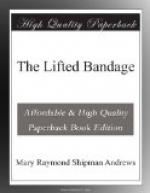The older man looked at him heavily. “You’d say that. Jack’s friends will. I’ve been trained to weigh evidence—I must believe it.”
“Listen,” the young man urged. “Don’t shut down the gates like that. I’m not a lawyer, but I’ve been trained to think, too, and I believe you’re not thinking squarely. There’s other evidence that counts besides this. There’s Jack—his personality.”
“It has been taken into consideration.”
“It can’t be taken into consideration by strangers—it needs years of intimacy to weigh that evidence as I can weigh it—as you—You know best of all,” he cried out impulsively, “if you’ll let yourself know, how impossible it was. That Jack should have bought that pistol and taken it to Ben Armstrong’s rooms to kill him—it was impossible—impossible!” The clinched fist came down on the black broadcloth knee with the conviction of the man behind it. The words rushed like melted metal, hot, stinging, not to be stopped. The judge quivered as if they had stung through the callousness, touched a nerve. A faint color crawled to his cheeks; for the first time he spoke quickly, as if his thoughts connected with something more than gray matter.
“You talk about my not allowing myself to believe in Jack. You seem not to realize that such a belief would—might—stand between me and madness. I’ve been trying to adjust myself to a possible scheme of living—getting through the years till I go into nothingness. I can’t. All I can grasp is the feeling that a man might have if dropped from a balloon and forced to stay gasping in the air, with no place in it, nothing to hold to, no breath to draw, no earth to rest on, no end to hope for. There is nothing beyond.”
“Everything is beyond,” the young man cried triumphantly. “‘The end,’ as you call it, is an end to hope for—it is the beginning. The beginning of more than you have ever had—with them, with the people you care about.”
The judge turned a ghastly look upon the impetuous, bright face. “If I believed that, I should be even now perfectly happy. I don’t see how you Christians can ever be sorry when your friends die—it’s childish; anybody ought to be able to wait a few years. But I don’t believe it,” he said heavily, and went on again as if an inertia of speech were carrying him as an inertia of silence had held him a few minutes before. “When my wife died a year ago it ended my personal life, but I could live Jack’s life. I was glad in the success and honor of it. Now the success—” he made a gesture. “And the honor—if I had that, only the honor of Jack’s life left, I think I could finish the years with dignity. I’ve not been a bad man—I’ve done my part and lived as seemed right. Before I’m old the joy is wiped out and long years left. Why? It’s not reasonable—not logical. With one thing to hold to, with Jack’s good name, I might live. How can I, now? What can I do? A life must have a raison d’etre.”




